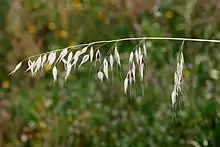參見:、 和
加利西亞語

avea
詞源
發音
- 國際音標(幫助):/aˈβea̝/
名詞
f (複數)
- 燕麥
- 1331, Antonio López Ferreiro (ed.), Fueros municipales de Santiago y de su tierra. Madrid: Ediciones Castilla, page 542:
- de quanto centeo e auea e orjo labraren en ese Regengo ha de auer o arcobispo ou seu mayordomo a meadad despois que os labradores tomaren o seu dereito
- of all the rye, oat and barley that they would grow in this crown's possession, the archbishop or his steward must have half of it, after the laborers have taken their parts
- de quanto centeo e auea e orjo labraren en ese Regengo ha de auer o arcobispo ou seu mayordomo a meadad despois que os labradores tomaren o seu dereito
- 1409, José Luis Pensado Tomé (ed.), Tratado de Albeitaria. Santiago de Compostela: Centro Ramón Piñeiro, page 61:
- Jtem. deue o potro comer feo, palla, herua, orio, auea, espelqa, que quer dizer melga, et as qousas semellauelles a esto, que naturalmente som para seu comer.
- Item. The foal must eat hay, straw, grass, barley, oat, spelt —that is, melga— and things that are similar to these, which are naturally for them to eat
- Jtem. deue o potro comer feo, palla, herua, orio, auea, espelqa, que quer dizer melga, et as qousas semellauelles a esto, que naturalmente som para seu comer.
- 1331, Antonio López Ferreiro (ed.), Fueros municipales de Santiago y de su tierra. Madrid: Ediciones Castilla, page 542:
派生詞
參考資料
- “auea” in Dicionario de Dicionarios do galego medieval, SLI - ILGA 2006–2022.
- “auea” in Xavier Varela Barreiro & Xavier Gómez Guinovart: Corpus Xelmírez - Corpus lingüístico da Galicia medieval. SLI / Grupo TALG / ILG, 2006-2016.
- “avea” in Dicionario de Dicionarios da lingua galega, SLI - ILGA 2006-2013.
- "avea" in Tesouro informatizado da lingua galega. Santiago: ILG.
- “avea” in Álvarez, Rosario (coord.): Tesouro do léxico patrimonial galego e portugués, Santiago de Compostela: Instituto da Lingua Galega.
羅馬尼亞語
詞源
發音
- 國際音標(幫助):/aˈve̯a/
動詞
(第三人稱單數現在式,過去分詞) 第二類變位
使用注意
- avea 有三種變位:一種是作完全動詞使用或形成未來時 (el/ea are), 一種是形成完成時 (el/ea a) ,還有一種是形成現在、過去式 (el/ea ar)。
變位
avea 的變位 (第二類變位, 過去分詞結尾帶-ut)
派生詞
This article is issued from Wiktionary. The text is licensed under Creative Commons - Attribution - Sharealike. Additional terms may apply for the media files.